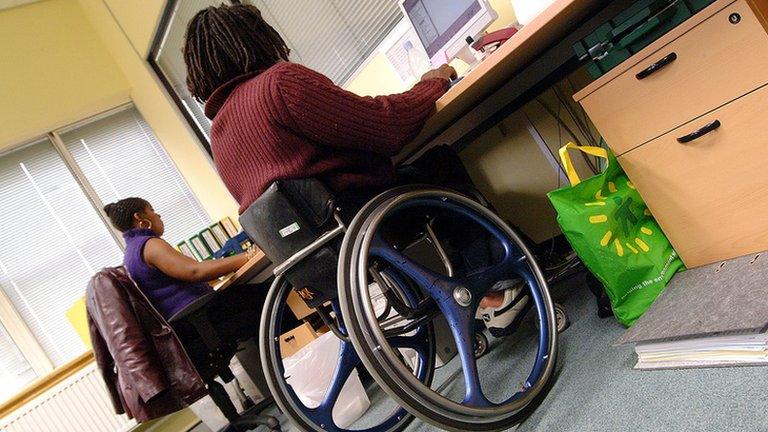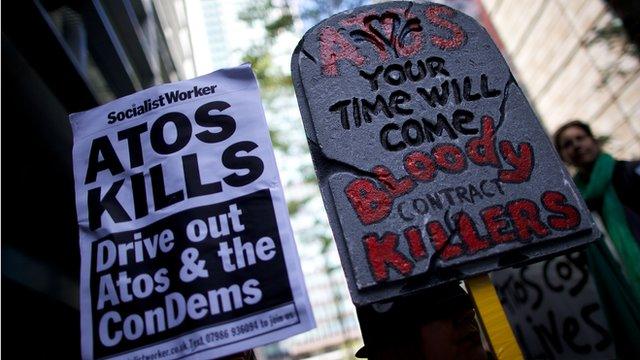Atos was 'lightning rod' for anger over benefit changes
- Published

Atos paid "substantial" compensation to the government to withdraw from the contract
The company which is quitting its contract to provide fitness-for-work assessments for the government has warned its successor will also struggle unless the process is improved.
Atos officials said their staff were "vilified" simply for carrying out what was asked of them by ministers.
They told MPs that other firms would find it hard to hire staff due to "negative coverage" about their work.
Critics say delays and wrong decisions have caused distress to the vulnerable.
Ministers announced in March that the contract to deliver Work Capability Assessments in England, Wales and Scotland was being terminated early by mutual consent after criticism of the French contractor's performance.
The contract had been due to end in August 2015.
More than three million people on employment and support allowance, including all those who previously claimed incapacity benefit, are being assessed to see how their illness or disability affects their ability to work in a process that began under Labour but which has been accelerated by the coalition government.
'Lightning rod'
Facing questioning by the Commons Work and Pensions Committee, Atos senior vice president Lisa Coleman acknowledged the firm had not got everything right since October 2010.

Atos has faced protests about its role in delivering welfare changes in the UK
She also conceded an inability to make a sufficient profit was a factor in the firm's decision to withdraw from the contract, for which it has had to pay compensation.
But she said Atos had become a "lightning rod" for public anger with the principle of the fitness-to-work assessments and it was "massively over-simplistic" to think a change of provider would change that.
"Unless something is done around educating people what the actual operational reality of that policy really is and what they mean potentially for individuals going through that then I find it difficult to see that actually just changing the supplier will change things," she said.
"We often find that when somebody makes a comment that Atos has done an assessment incorrectly, actually, against the policy, what has happened has been right,.
"It is very difficult to understand that somebody with a very challenging or quite a difficult condition doesn't go through the process as you might expect."
Workers 'vilified'
Helen Hall, the firm's head of communications and customer relations, said more than a quarter of the firm's assessors had quit as a result of abuse they had been subjected to.
"They are professional trained people," she said. "They care about the job they do. They are doing a very good job of applying the legislation the government has laid out and despite that they are being vilified for it.
"The level of intimidation, the level of negative coverage about professional people...I'm not sure that's an issue that can be resolved by a new provider just throwing money at that."
A climate of suspicion had built up, she suggested, with many of those being tested wrongly believing that the assessors were not trained and would "treat them with contempt".
"What we have seen quite often now is people coming in for an assessment and they are actually saying at the end of it 'you've just been recorded on my iPhone and I am going to expose you on the internet'.
Tests 'flawed'
"If you put all those together and imagine how both those parties are feeling, that environment is something that has to change.
"I personally don't think the private provider by themselves can achieve that level of change."
Disability campaigners maintain the tests are "fundamentally flawed" and are being driven by the government's desire to reduce the welfare bill.
Ministers have said nearly a million people who applied for sickness benefit have been found fit for work and the tests have been subject to continual reviews to identify problems.
The government wants a new provider in place by next year to speed up the number of assessments and to reduce waiting times and that the contract could ultimately be divided up between a number of firms.
Atos will continue to carry out the assessments in Northern Ireland under a separate contract.
- Published6 April 2014

- Published27 March 2014

- Published21 February 2014
